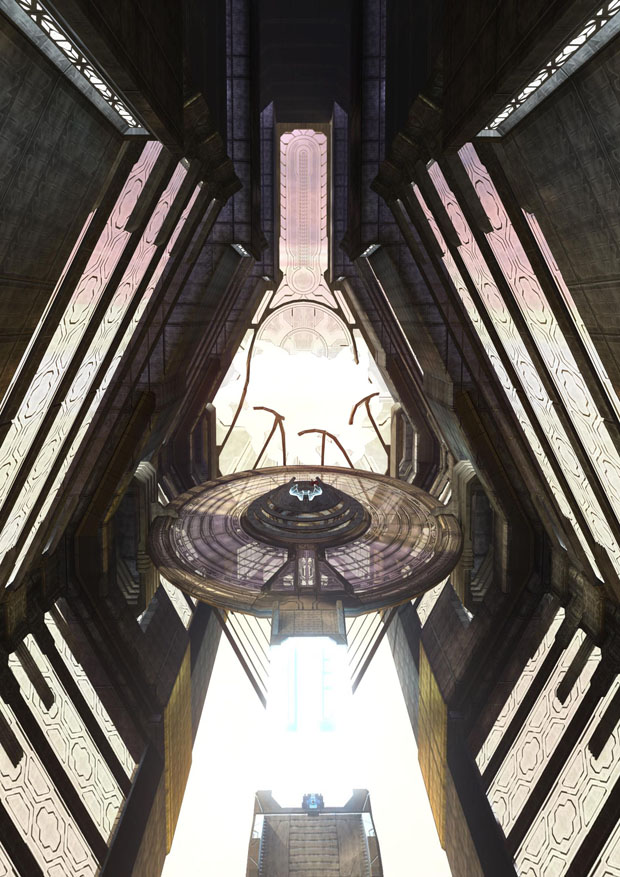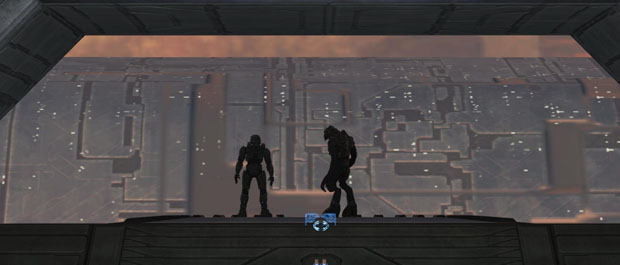She Died in Eden (II)
Librarian:
I’m close to finishing the task. The indexing and the archival processes are as complete as I can hope for. If we wait longer, we risk catastrophe. The thing has already destroyed every colony on my side of the line.
Please. Activate the Array.
An unknown period of time passes between the first collection of messages and this one. At this point, Librarian is nearing the end of her mission. She states that the cataloging has gained some closure and that there’s no time left; Didact must activate the Array. As witnessed in Halo 2, the activation of the Array doesn’t fire the weapon immediately – it simply puts it into a status where the rings can be fired from any installation – or, if the failsafe is activated, directly from the Ark’s control citadel.

From Librarian, this statement seems like a petition or request, which implies a fissure of sorts between two rather disparate elements of the plan. One would think that she need only to give Didact the request and he would immediately heed, but this is not the case. In this exchange, it appears as though Didact solely controls the Array and his judgment alone dictates when it is fired.
The Conservation Measure, however, is not completely attached to the Array’s firing or the body (the military) which controls the firing. There must have been a schism at some point in how this was to be handled. Perhaps the Measure was approved by a separate governing body (with authority over Didact) or maybe Librarian facilitated and financed the Measure secretly, by herself and behind closed doors – either way, there was a rift. It was not just a simple plan, but a plan and an ulterior countermeasure against the plan’s horrible reality.
Here Librarian is asking that Didact activate the Array. If he does, she will be claimed by the weapon. If he doesn’t, he risks the parasite’s survival and the end of his kind. What would you do if the person you loved the most would die when you pulled the trigger? Would you damn that person to save the world? Could you?
No. Activation is murder. A genocide larger than [this galaxy] has ever known. We are sworn to protect life not destroy it! That is the Mantle we were given to carry.
One of the shortest entries to be certain, but one of the most significant without a doubt.
Didact, although given control of this last resort, is extremely hesitant to use it. And even though the reason for his balking is not fully revealed yet, it is clear he is buying time with this rhetoric.
One could suspect that he doesn’t want to activate it at this time because there may be a cure just over the horizon, a way to halt the parasite’s threat and reverse or disable its effects. This was a major part of the reason the Halo installations were created: to isolate, study and examine the Flood in the hope of a cure. He also may be considering that they could be on the verge of a breakthrough militarily, close to routing the Flood out of their galaxy or eradicating it completely.
That being said, the most likely reason was that he wanted to see Librarian return safely home.

Excusing his reluctance, he speaks of the Mantle. Although this belief system has been discussed in our articles previously, the messages transferred between Didact and Librarian give us the majority of data regarding it. As he states it from the very beginning, the belief in the Mantle involves swearing to protect life, not destroy it. The activation of the Array and its subsequent firing would obliterate a great deal of life and therein lies his argument against firing.
Keep in mind that if Didact is in charge of firing the Array then it must mean that the military, a force which obviously subscribes to the Mantle, had also assisted with the construction and purposing of the Ark and its seven Halo installations. On each of these installations (of which come in various environmental conditions) are laboratories, containment facilities and quarantine zones – locations where the parasite could be studied and examined. The hope initially had been a cure, with only the hint of the Halo Array’s true purpose hanging in the balance.
Now that a cure seems improbable if not impossible, Didact is clinging to the Mantle with all that he has left in him. He may well believe in the Mantle and his duty to uphold it, but this isn’t the real reason he avoids activating it. His hands are stayed because she will be killed if he pulls the trigger.
Librarian, the scientist she is, has never been one for religious games. She does not share his spiritual convictions:
The Mantle. You still hold to that [fairy tale] after all that has happened? After this thing has consumed a million worlds?
Can’t you see? Belief in the Mantle sealed our doom! Weakened our [protectorates], bred dependence and sloth. Our [so-called Guardianship] has stripped those we would keep safe of any capacity for self-defense!
Were we such noble [Guardians] when we drew our line and abandoned billions to the parasite?
Even though we’re really only looking at a microcosm relationship in the midst of what is likely multiplied trillions of Forerunner beings that existed, we get the idea that the belief in the Mantle, as a whole, was somewhat disputed. Whether this is a new dispute or something which has always existed like a crack in the foundation of the belief system is unknown. Whatever the case may be, it clearly shows that much like the Maginot Line which separates them, Didact and the military are on one side of the ideological barrier while Librarian and the Conservation Measure is on the other.
She does not hold her tongue as she describes what she feels was inaction and hypocrisy by the Forerunner race. Here she refers to the Mantle as a ‘fairy tale’ – a fictional vice which has ultimately become their undoing.
Another central theme to this passage is that of disarmament. How it happened or why it even took place is not specifically depicted, but we do know that at some point the Mantle persuaded the central government or military to remove their kind’s weapons on a planetary level. This may have even extended to non-Forerunner races, as Librarian’s statement seems to be all-inclusive.
As the oath indicates, the Forerunners are Guardians, their goal is to prevent the loss of life. Since any weapon can cause death, logic would tell us their removal would prevent people from dying by them. Of course the naiveté of an outside influence, an unquestionable evil from elsewhere, eventually trumped their logic. When the parasite arrived, the individual planetary citizens had no means to protect themselves so they hid on their planets’ surfaces and barricaded themselves in their buildings. In most cases, a world which was even touched by the Flood was obliterated, either suicidally by the planetary government or by the Forerunner’s galactic navy.

The goal was to eliminate resources – eliminate sentient life. The Flood needed sentience to survive like an animal needs food or a plant needs water. Mass suicide provided this solution.
Were we such noble Guardians when we drew our line and abandoned billions to the parasite?
This is perhaps the most powerful and telling line in all of the terminal entries, Librarian’s hard line accusation against the Mantle. When stopping the Flood or even addressing it at a remedial level became devoid of value, the Forerunner military engineered their last resort and created the Line.
By doing this, the blatant hypocrisy of the Mantle was openly displayed. Librarian’s claim was that when the Flood arrived, the rules changed – and although she was doing everything she could to save the lives of the innocent, she knew that the Array was the only way to prevent this from annihilating everything. They had to bring an end to the Flood, even if they destroyed their way of life with it.